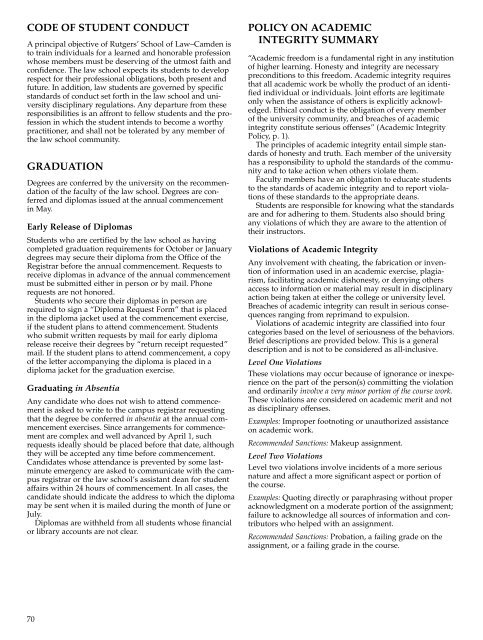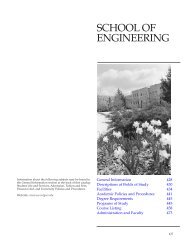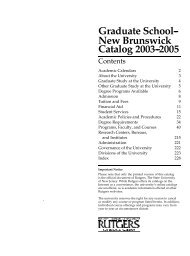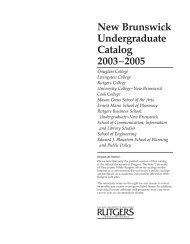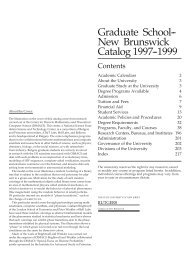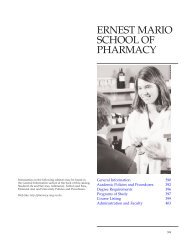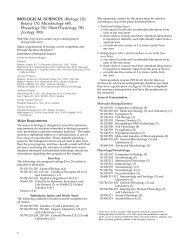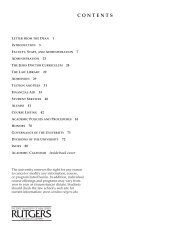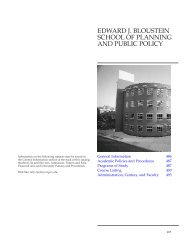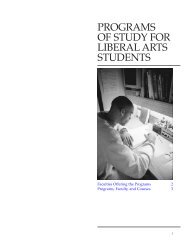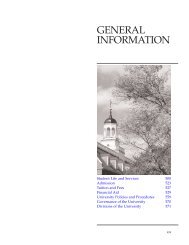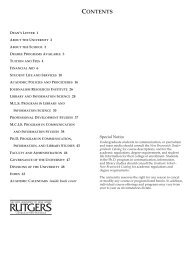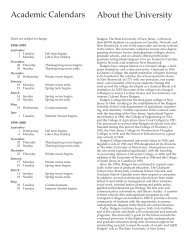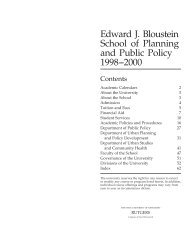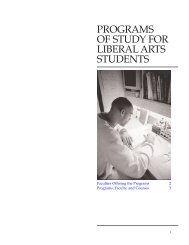Rutgers University School of Law-Camden - Catalogs - Rutgers, The ...
Rutgers University School of Law-Camden - Catalogs - Rutgers, The ...
Rutgers University School of Law-Camden - Catalogs - Rutgers, The ...
Create successful ePaper yourself
Turn your PDF publications into a flip-book with our unique Google optimized e-Paper software.
CODE OF STUDENT CONDUCT<br />
A principal objective <strong>of</strong> <strong>Rutgers</strong>’ <strong>School</strong> <strong>of</strong> <strong>Law</strong>–<strong>Camden</strong> is<br />
to train individuals for a learned and honorable pr<strong>of</strong>ession<br />
whose members must be deserving <strong>of</strong> the utmost faith and<br />
confidence. <strong>The</strong> law school expects its students to develop<br />
respect for their pr<strong>of</strong>essional obligations, both present and<br />
future. In addition, law students are governed by specific<br />
standards <strong>of</strong> conduct set forth in the law school and university<br />
disciplinary regulations. Any departure from these<br />
responsibilities is an affront to fellow students and the pr<strong>of</strong>ession<br />
in which the student intends to become a worthy<br />
practitioner, and shall not be tolerated by any member <strong>of</strong><br />
the law school community.<br />
GRADUATION<br />
Degrees are conferred by the university on the recommendation<br />
<strong>of</strong> the faculty <strong>of</strong> the law school. Degrees are conferred<br />
and diplomas issued at the annual commencement<br />
in May.<br />
Early Release <strong>of</strong> Diplomas<br />
Students who are certified by the law school as having<br />
completed graduation requirements for October or January<br />
degrees may secure their diploma from the Office <strong>of</strong> the<br />
Registrar before the annual commencement. Requests to<br />
receive diplomas in advance <strong>of</strong> the annual commencement<br />
must be submitted either in person or by mail. Phone<br />
requests are not honored.<br />
Students who secure their diplomas in person are<br />
required to sign a “Diploma Request Form” that is placed<br />
in the diploma jacket used at the commencement exercise,<br />
if the student plans to attend commencement. Students<br />
who submit written requests by mail for early diploma<br />
release receive their degrees by “return receipt requested”<br />
mail. If the student plans to attend commencement, a copy<br />
<strong>of</strong> the letter accompanying the diploma is placed in a<br />
diploma jacket for the graduation exercise.<br />
Graduating in Absentia<br />
Any candidate who does not wish to attend commencement<br />
is asked to write to the campus registrar requesting<br />
that the degree be conferred in absentia at the annual commencement<br />
exercises. Since arrangements for commencement<br />
are complex and well advanced by April 1, such<br />
requests ideally should be placed before that date, although<br />
they will be accepted any time before commencement.<br />
Candidates whose attendance is prevented by some lastminute<br />
emergency are asked to communicate with the campus<br />
registrar or the law school’s assistant dean for student<br />
affairs within 24 hours <strong>of</strong> commencement. In all cases, the<br />
candidate should indicate the address to which the diploma<br />
may be sent when it is mailed during the month <strong>of</strong> June or<br />
July.<br />
Diplomas are withheld from all students whose financial<br />
or library accounts are not clear.<br />
POLICY ON ACADEMIC<br />
INTEGRITY SUMMARY<br />
“Academic freedom is a fundamental right in any institution<br />
<strong>of</strong> higher learning. Honesty and integrity are necessary<br />
preconditions to this freedom. Academic integrity requires<br />
that all academic work be wholly the product <strong>of</strong> an identified<br />
individual or individuals. Joint efforts are legitimate<br />
only when the assistance <strong>of</strong> others is explicitly acknowledged.<br />
Ethical conduct is the obligation <strong>of</strong> every member<br />
<strong>of</strong> the university community, and breaches <strong>of</strong> academic<br />
integrity constitute serious <strong>of</strong>fenses” (Academic Integrity<br />
Policy, p. 1).<br />
<strong>The</strong> principles <strong>of</strong> academic integrity entail simple standards<br />
<strong>of</strong> honesty and truth. Each member <strong>of</strong> the university<br />
has a responsibility to uphold the standards <strong>of</strong> the community<br />
and to take action when others violate them.<br />
Faculty members have an obligation to educate students<br />
to the standards <strong>of</strong> academic integrity and to report violations<br />
<strong>of</strong> these standards to the appropriate deans.<br />
Students are responsible for knowing what the standards<br />
are and for adhering to them. Students also should bring<br />
any violations <strong>of</strong> which they are aware to the attention <strong>of</strong><br />
their instructors.<br />
Violations <strong>of</strong> Academic Integrity<br />
Any involvement with cheating, the fabrication or invention<br />
<strong>of</strong> information used in an academic exercise, plagiarism,<br />
facilitating academic dishonesty, or denying others<br />
access to information or material may result in disciplinary<br />
action being taken at either the college or university level.<br />
Breaches <strong>of</strong> academic integrity can result in serious consequences<br />
ranging from reprimand to expulsion.<br />
Violations <strong>of</strong> academic integrity are classified into four<br />
categories based on the level <strong>of</strong> seriousness <strong>of</strong> the behaviors.<br />
Brief descriptions are provided below. This is a general<br />
description and is not to be considered as all-inclusive.<br />
Level One Violations<br />
<strong>The</strong>se violations may occur because <strong>of</strong> ignorance or inexperience<br />
on the part <strong>of</strong> the person(s) committing the violation<br />
and ordinarily involve a very minor portion <strong>of</strong> the course work.<br />
<strong>The</strong>se violations are considered on academic merit and not<br />
as disciplinary <strong>of</strong>fenses.<br />
Examples: Improper footnoting or unauthorized assistance<br />
on academic work.<br />
Recommended Sanctions: Makeup assignment.<br />
Level Two Violations<br />
Level two violations involve incidents <strong>of</strong> a more serious<br />
nature and affect a more significant aspect or portion <strong>of</strong><br />
the course.<br />
Examples: Quoting directly or paraphrasing without proper<br />
acknowledgment on a moderate portion <strong>of</strong> the assignment;<br />
failure to acknowledge all sources <strong>of</strong> information and contributors<br />
who helped with an assignment.<br />
Recommended Sanctions: Probation, a failing grade on the<br />
assignment, or a failing grade in the course.<br />
70


